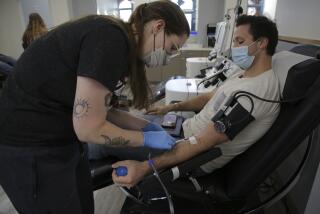U.S. Blood Supply Considered Relatively Safe From Disease
In spite of recent concerns, the Food and Drug Administration considers the blood supply in the United States to be as safe as ever.
The likelihood of contracting an infectious illness through a blood transfusion is extremely low. The risk of HIV infection is estimated to be about 1 in 677,000 units, the risk of hepatitis C infection is about 1 in 103,000 units, and the risk of hepatitis B infection about 1 in 63,000. There is also little evidence that Creutzfeldt-Jakob Disease, or CJD--a rare but fatal disease that has been linked with an outbreak of “mad cow disease” in the United Kingdom--can be transmitted through blood transfusions. Nevertheless, in order to ensure the safety of the blood supply, the FDA has recommended that individuals who have CJD or are thought to be at increased risk of developing it not be allowed to donate.
Because there is not currently a good laboratory test for identifying people with CJD, a series of screening questions is used to determine if a donor is potentially infectious. Individuals who have spent six months or more in the U.K. from 1980 through 1996 as well as those who have received an injection of beef insulin made from cattle in Britain since 1980, for example, are not considered acceptable donors.
More to Read
Sign up for Essential California
The most important California stories and recommendations in your inbox every morning.
You may occasionally receive promotional content from the Los Angeles Times.










